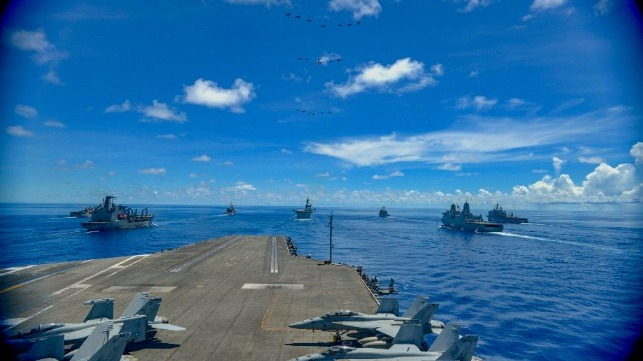China’s Economic Blunder Over Taiwan

China and the U.S. are saber-rattling once again as the harassment of Taiwan by the mainland continues with hundreds of sorties of fighters, bombers, and submarines near the island's air and sea space.
President Xi Jinping has made clear that all options are on the table and warned the U.S., NATO, and the Indo-Pacific allies known as "the Quad" (U.S., Australia, India, Japan) to stop meddling in its internal affairs. China has spent decades building the People's Liberation Army's strength and now doubts the U.S. has the will or the might to stop a forceful reunification of Taiwan with mainland China, separated by the 100-mile-wide Taiwan Strait.
Meanwhile, the U.S. military presence in the South China Sea has increased with the return from the Indian Ocean of the armada of warships known as the Ronald Reagan Strike Group, which provides security in the strait.
The South China Sea is already on high alert as China annexes islands in the Spratly Archipelago, demands historical rights to Japan's Senkaku Islands, and still claims its maritime Nine-Dash Line through the Gulf of Tonkin and the South China Sea, which was denied by the Permanent Court of Arbitration in The Hague. Saber-rattling indeed!
Consequences
As China aggressively postures with Taiwan and the U.S., what's at stake is that China's economy is heavily dependent on the South China Sea trade lanes, which account for roughly one-third of global trade and through which the majority of China's exports and imports pass.

that matters most
Get the latest maritime news delivered to your inbox daily.
China's missteps on Taiwan could send the world economy into chaos, and its economy would implode. While President Xi Jinping and China's military leaders believe that the time for the "reunification" of Taiwan is near, the U.S. and its allies will respond to keep the trade lanes open and safe.
With its economy in disarray as Xi imposes new restrictions on billionaire entrepreneurs and big companies, China's folly over Taiwan is like a psychotically depressed person's final act. Xi wants to leave a legacy of unification, but China must be reminded of the economic consequences.
The opinions expressed herein are the author's and not necessarily those of The Maritime Executive.
